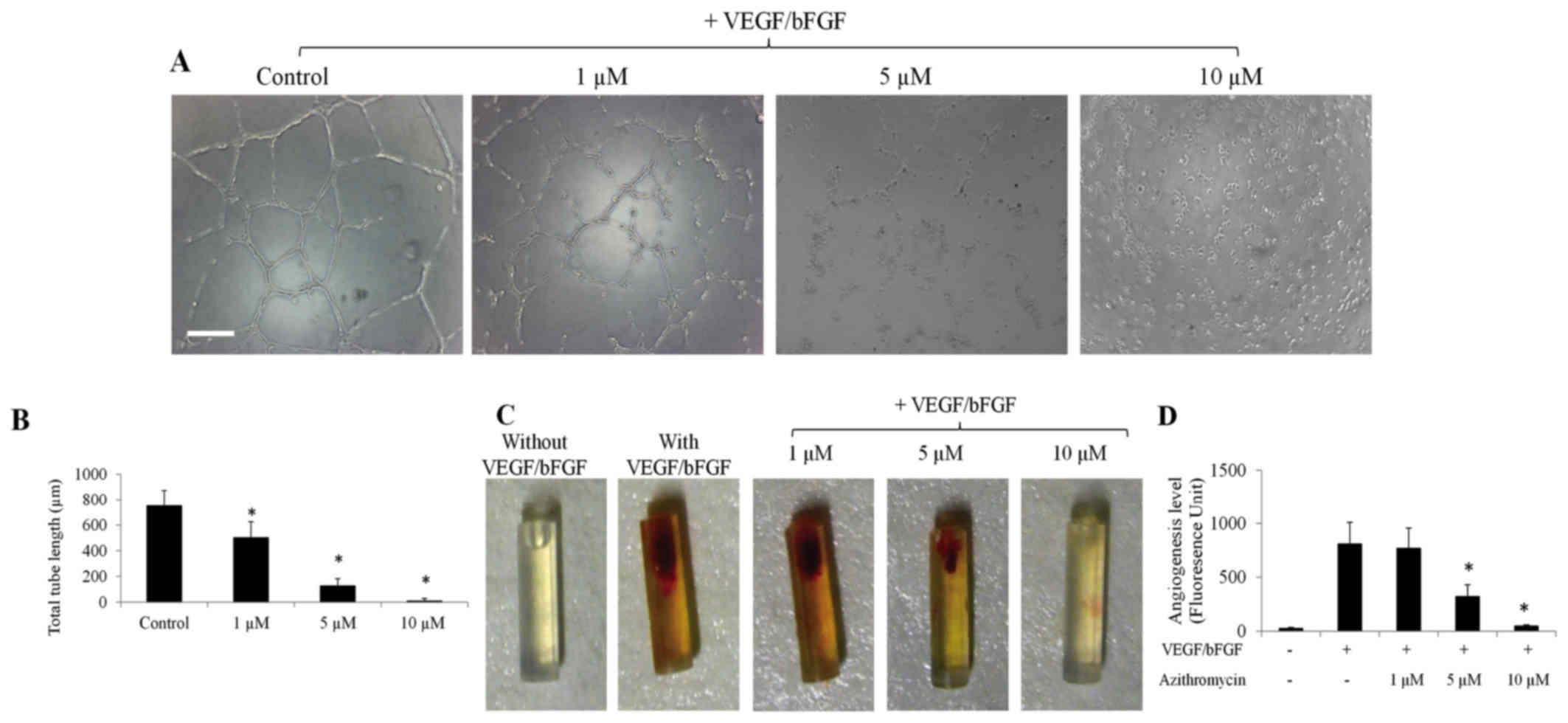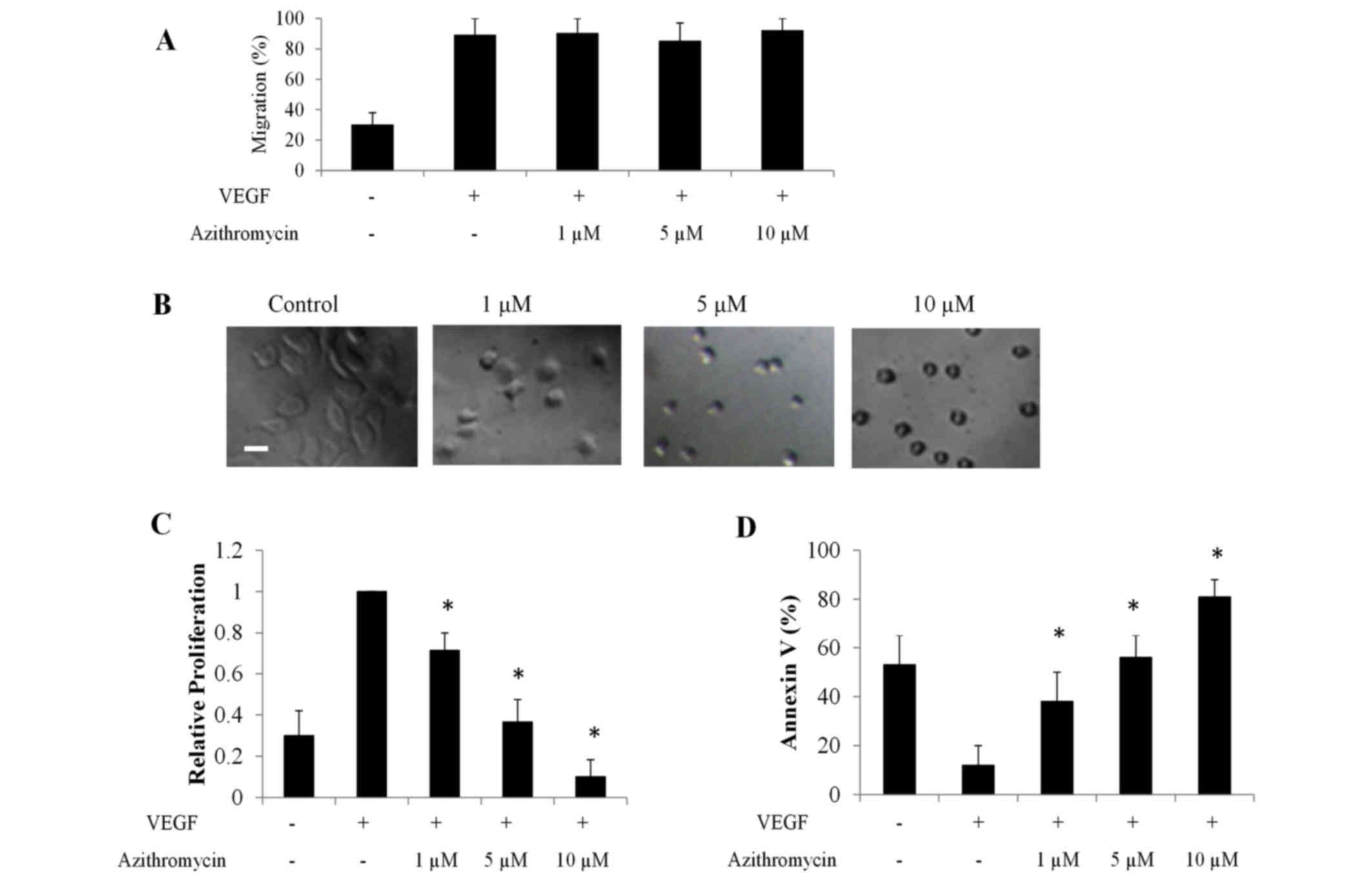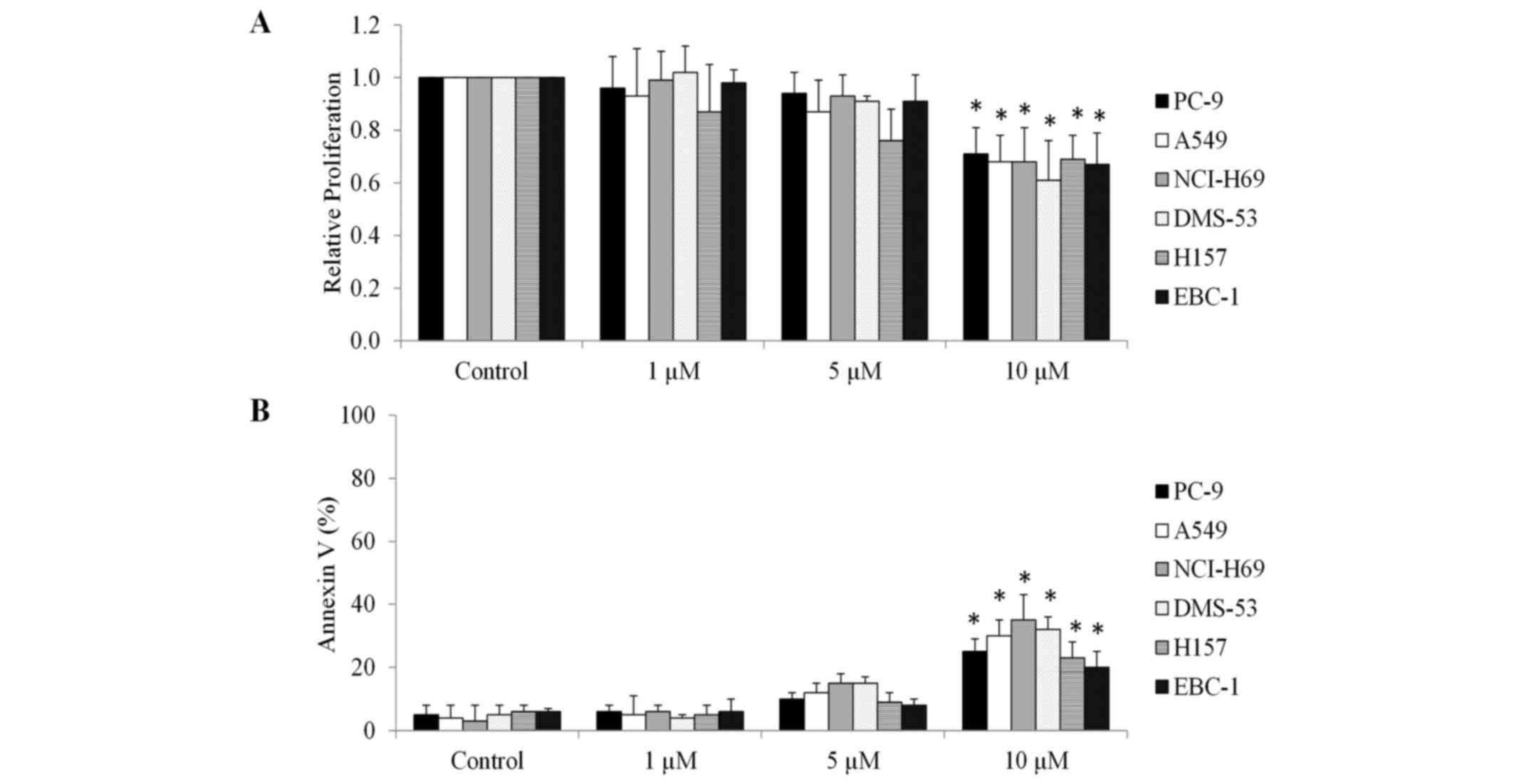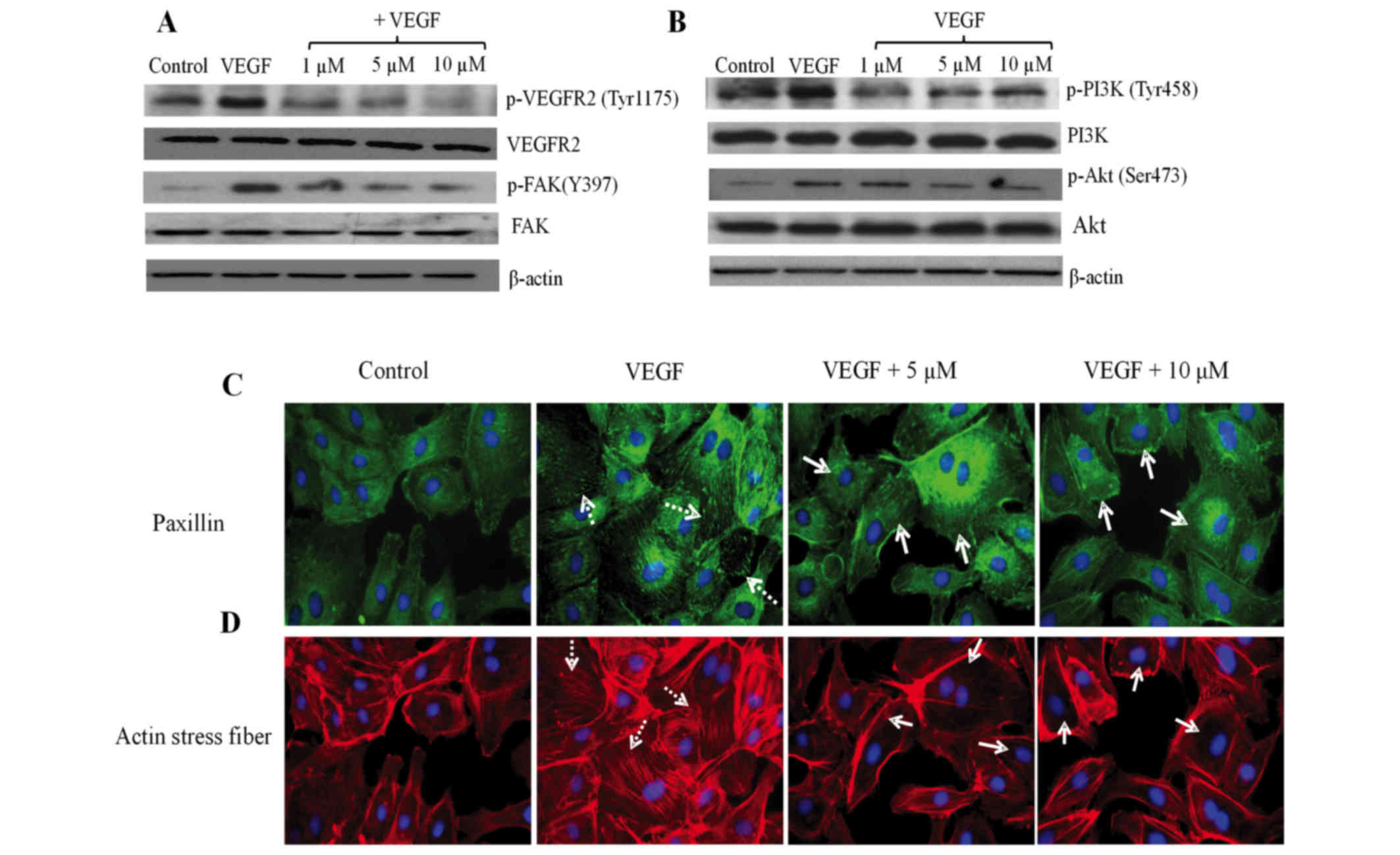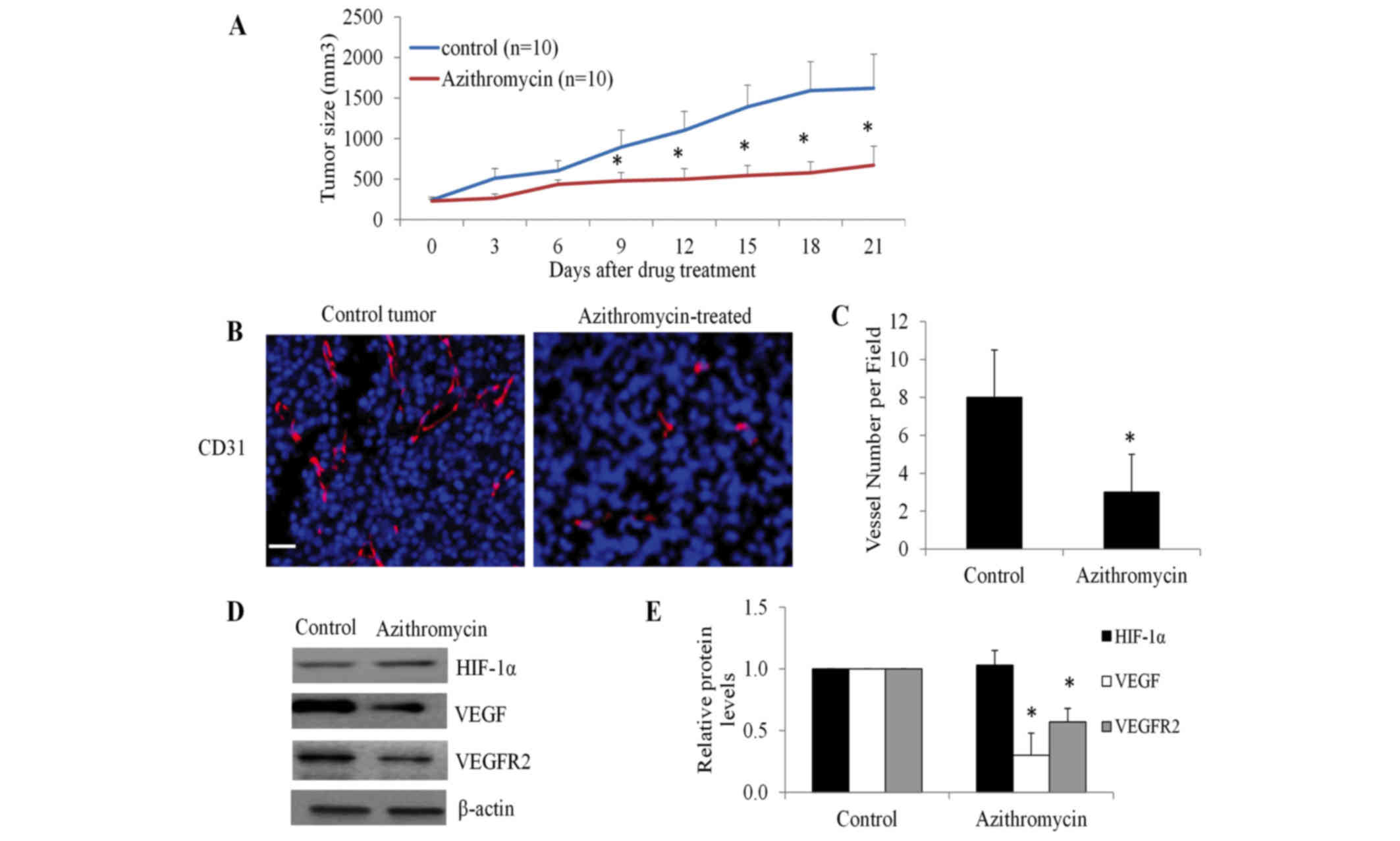|
1
|
Dancey J and Le Chevalier T: Non-small
cell lung cancer: An overview of current management. Eur J Cancer.
33 Suppl 1:S2–S7. 1997. View Article : Google Scholar : PubMed/NCBI
|
|
2
|
Blumenschein GR Jr, Reckamp K, Stephenson
GJ, O'Rourke T, Gladish G, McGreivy J, Sun YN, Ye Y, Parson M and
Sandler A: Phase 1b study of motesanib, an oral angiogenesis
inhibitor, in combination with carboplatin/paclitaxel and/or
panitumumab for the treatment of advanced non-small cell lung
cancer. Clin Cancer Res. 16:279–290. 2010. View Article : Google Scholar : PubMed/NCBI
|
|
3
|
Lind JS and Smit EF: Angiogenesis
inhibitors in the treatment of non-small cell lung cancer. Ther Adv
Med Oncol. 1:95–107. 2009. View Article : Google Scholar : PubMed/NCBI
|
|
4
|
Hanahan D and Folkman J: Patterns and
emerging mechanisms of the angiogenic switch during tumorigenesis.
Cell. 86:353–364. 1996. View Article : Google Scholar : PubMed/NCBI
|
|
5
|
Folkman J: Tumor angiogenesis: Therapeutic
implications. N Engl J Med. 285:1182–1186. 1971. View Article : Google Scholar : PubMed/NCBI
|
|
6
|
Ferrara N: The role of vascular
endothelial growth factor in pathological angiogenesis. Breast
Cancer Res Treat. 36:127–137. 1995. View Article : Google Scholar : PubMed/NCBI
|
|
7
|
Han H, Silverman JF, Santucci TS, Macherey
RS, d'Amato TA, Tung MY, Weyant RJ and Landreneau RJ: Vascular
endothelial growth factor expression in stage I non-small cell lung
cancer correlates with neoangiogenesis and a poor prognosis. Ann
Surg Oncol. 8:72–79. 2001. View Article : Google Scholar : PubMed/NCBI
|
|
8
|
Fontanini G, Bigini D, Vignati S, Basolo
F, Mussi A, Lucchi M, Chine S, Angeletti CA, Harris AL and
Bevilacqua G: Microvessel count predicts metastatic disease and
survival in non-small cell lung cancer. J Pathol. 177:57–63. 1995.
View Article : Google Scholar : PubMed/NCBI
|
|
9
|
Horn L and Sandler AB: Angiogenesis in the
treatment of non-small cell lung cancer. Proc Am Thorac Soc. 6:pp.
206–217. 2009; View Article : Google Scholar : PubMed/NCBI
|
|
10
|
Zhao L, Li W, Zhang H, Hou N, Guo L and
Gao Q: Angiogenesis inhibitors rechallenge in patients with
advanced non-small-cell lung cancer: A pooled analysis of
randomized controlled trials. Onco Targets Ther. 8:2775–2781.
2015.PubMed/NCBI
|
|
11
|
Zhang TT, Wang RM, Yang Z and Chen GB:
Dual inhibiting EGFR and VEGF pathways versus EGFR-TKIs alone in
the treatment of advanced non-small-cell lung cancer: A
meta-analysis of randomized controlled trials. Clin Transl Oncol.
18:576–581. 2016. View Article : Google Scholar : PubMed/NCBI
|
|
12
|
Zhang J, Liu J, Chen H, Wu W, Li X, Wu Y,
Zhang K and Gu L: The impact of histological types on the efficacy
of angiogenesis inhibitors in the treatment of advanced NSCLC: A
meta-analysis of randomized controlled trials. Onco Targets Ther.
8:2375–2382. 2015.PubMed/NCBI
|
|
13
|
Esposito S, Bosis S, Faelli N, Begliatti
E, Droghetti R, Tremolati E, Porta A, Blasi F and Principi N: Role
of atypical bacteria and azithromycin therapy for children with
recurrent respiratory tract infections. Pediatr Infect Dis J.
24:438–444. 2005. View Article : Google Scholar : PubMed/NCBI
|
|
14
|
Champney WS and Burdine R: Macrolide
antibiotics inhibit 50S ribosomal subunit assembly in Bacillus
subtilis and Staphylococcus aureus. Antimicrob Agents Chemother.
39:2141–2144. 1995. View Article : Google Scholar : PubMed/NCBI
|
|
15
|
Kitsiouli E, Antoniou G, Gotzou H,
Karagiannopoulos M, Basagiannis D, Christoforidis S, Nakos G and
Lekka ME: Effect of azithromycin on the LPS-induced production and
secretion of phospholipase A2 in lung cells. Biochim Biophys Acta.
1852:1288–1297. 2015. View Article : Google Scholar : PubMed/NCBI
|
|
16
|
Lamb R, Ozsvari B, Lisanti CL, Tanowitz
HB, Howell A, Martinez-Outschoorn UE, Sotgia F and Lisanti MP:
Antibiotics that target mitochondria effectively eradicate cancer
stem cells, across multiple tumor types: Treating cancer like an
infectious disease. Oncotarget. 6:4569–4584. 2015. View Article : Google Scholar : PubMed/NCBI
|
|
17
|
Zhou X, Zhang Y, Li Y, Hao X, Liu X and
Wang Y: Azithromycin synergistically enhances anti-proliferative
activity of vincristine in cervical and gastric cancer cells.
Cancers (Basel). 4:1318–1332. 2012. View Article : Google Scholar : PubMed/NCBI
|
|
18
|
Chu DJ, Yao DE, Zhuang YF, Hong Y, Zhu XC,
Fang ZR, Yu J and Yu ZY: Azithromycin enhances the favorable
results of paclitaxel and cisplatin in patients with advanced
non-small cell lung cancer. Genet Mol Res. 13:2796–2805. 2014.
View Article : Google Scholar : PubMed/NCBI
|
|
19
|
Guedez L, Rivera AM, Salloum R, Miller ML,
Diegmueller JJ, Bungay PM and Stetler-Stevenson WG: Quantitative
assessment of angiogenic responses by the directed in vivo
angiogenesis assay. Am J Pathol. 162:1431–1439. 2003. View Article : Google Scholar : PubMed/NCBI
|
|
20
|
Madri JA and Pratt BM: Endothelial
cell-matrix interactions: In vitro models of angiogenesis. J
Histochem Cytochem. 34:85–91. 1986. View Article : Google Scholar : PubMed/NCBI
|
|
21
|
Davis GE and Senger DR: Endothelial
extracellular matrix: Biosynthesis, remodeling, and functions
during vascular morphogenesis and neovessel stabilization. Circ
Res. 97:1093–1107. 2005. View Article : Google Scholar : PubMed/NCBI
|
|
22
|
Ferrara N: The role of VEGF in the
regulation of physiological and pathological angiogenesis. EXS.
209–231. 2005.PubMed/NCBI
|
|
23
|
Kleinman HK, McGarvey ML, Hassell JR, Star
VL, Cannon FB, Laurie GW and Martin GR: Basement membrane complexes
with biological activity. Biochemistry. 25:312–318. 1986.
View Article : Google Scholar : PubMed/NCBI
|
|
24
|
Shibuya M: Vascular endothelial growth
factor-dependent and -independent regulation of angiogenesis. BMB
Rep. 41:278–286. 2008. View Article : Google Scholar : PubMed/NCBI
|
|
25
|
Lechertier T and Hodivala-Dilke K: Focal
adhesion kinase and tumour angiogenesis. J Pathol. 226:404–412.
2012. View Article : Google Scholar : PubMed/NCBI
|
|
26
|
Parums DV, Cordell JL, Micklem K, Heryet
AR, Gatter KC and Mason DY: JC70: A new monoclonal antibody that
detects vascular endothelium associated antigen on routinely
processed tissue sections. J Clin Pathol. 43:752–757. 1990.
View Article : Google Scholar : PubMed/NCBI
|
|
27
|
Karar J and Maity A: PI3K/AKT/mTOR pathway
in angiogenesis. Front Mol Neurosci. 4:512011. View Article : Google Scholar : PubMed/NCBI
|
|
28
|
Kim GD, Oh J, Park HJ, Bae K and Lee SK:
Magnolol inhibits angiogenesis by regulating ROS-mediated apoptosis
and the PI3K/AKT/mTOR signaling pathway in mES/EB-derived
endothelial-like cells. Int J Oncol. 43:600–610. 2013.PubMed/NCBI
|
|
29
|
He L, Wu Y, Lin L, Wang J, Wu Y, Chen Y,
Yi Z, Liu M and Pang X: Hispidulin, a small flavonoid molecule,
suppresses the angiogenesis and growth of human pancreatic cancer
by targeting vascular endothelial growth factor receptor
2-mediatedPI3K/Akt/mTOR signaling pathway. Cancer Sci. 102:219–225.
2011. View Article : Google Scholar : PubMed/NCBI
|















